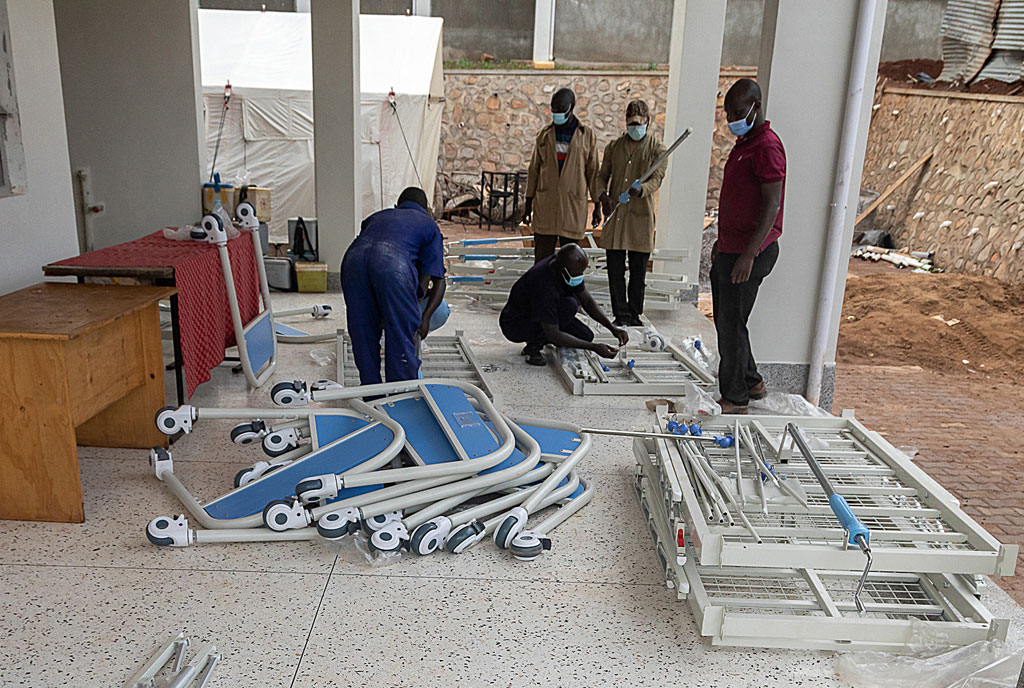
Mr Medard Ashaba was admitted to the Ebola isolation unit at Mubende Regional Referral Hospital after developing symptoms of the disease. PHOTO/ALEX ASHABA
|National
Prime
What I saw in Ebola isolation unit
What you need to know:
- Mr Ashaba says suspected Ebola patients are treated for other diseases as they wait for their Ebola test results.
On September 23, Mr Medard Ashaba, 43, a resident of Kigarama Village in Bugongo Town Council, Kyegegwa District, was admitted to Mubende Regional Referral Hospital isolation unit after developing signs and symptoms of Ebola Virus Disease (EVD).
“It was Friday morning when I got a headache, had a running stomach and started vomiting. All this happened in a short period of time. I called my village chairperson and he advised me to stay at home and wait for an ambulance,” he said.
ALSO READ: Survivor narrates Ebola ordeal
Mr Ashaba said an hour later, his health had deteriorated and he decided to walk to Bugongo Health Centre II, which is 3km away from his home.
He said at the facility, he was tested for malaria but the results came back negative.
“I was getting worse and the health workers decided to call an ambulance which took me to Mubende Regional Referral Hospital. In the ambulance, I thought I was going to die. I thought I had Ebola because I had attended a burial earlier of a child suspected to have had the disease,” he said.
Isolation
At Mubende hospital, Mr Ashaba said he was received by health workers dressed in full personal protective equipment.
They took his temperature and tested him for other diseases. He was diagnosed with hypertension and diarrhoea.
“There are many isolation wards at the facility made of tents and one with permanent structures. I was taken to one of the tents. I was panicking because I found there many Ebola suspects,” he said.
He said the tents are well lit and suspected Ebola patients are kept separately from those who have been confirmed to have the disease.
“I was given a bed. They first disinfect it. Each bed is separated by curtains, you can’t see your fellow suspected patients but you can hear them [speak],” he said.
He added: “The place is clean. They keep cleaning it all the time and limit you from unnecessary movements. The suspects can’t cross to the section of Ebola patients.”
Mr Ashaba said the health workers gave him first aid and later gave him medication for hypertension and diarrhoea. He started feeling better.
On Saturday afternoon, his blood samples were taken to check for Ebola.
Treatment
According to Mr Ashaba, all the suspected Ebola patients are diagnosed with a disease that they are treated for while in isolation as they await the results from their blood samples.
“When they diagnosed me with hypertension and other diseases, immediately I started on treatment as I was waiting for my results. They came when I was getting better,” he said.
He said inside the isolation room, patients were not allowed to have attendants. He added that they were given food three times a day.
“We were served breakfast (chapati, egg, and rice) while at lunch we were served with matooke, g-nuts, beans and sometimes meat. We were also given supper. Personally, I did not feel hungry,” he said.
On September 27, Mr Ashaba’s results returned negative and he was discharged immediately.
“When I heard that my results came back, I started fearing but I was no longer vomiting and did not have a running stomach. When the doctor told me that I was negative, I thanked God. If the results had come back showing that I was positive, I was going to start on treatment,” he said.
He added that he was given medicine which he is still using and was advised to stay away from crowds.
“The time I spent in isolation, I did not see any person dying of Ebola but you could hear patients crying and all the time you keep hearing ambulance sounds bringing Ebola suspects,” Mr Ashaba said.
Stigma
“After I was taken to Mubende hospital, people in the village declared me dead. People started calling my wife telling her to prepare my grave, saying I died and my body was being kept in the mortuary,” Mr Ashaba said.
He added that on his way back home, many people ran away from him while the rest refused to get close to him.
Mr Ashaba, however, said his family members never shunned him.
His wife, Ms Lydia Natukunda, said their neighbours stopped visiting them and their children were discriminated against in the village.
“When they heard that my husband was admitted, the following morning, they started calling me that he had died, others told me he was put on oxygen. I remained strong and kept praying and I thank God to see that he tested negative,” she said.
Mr Ashaba says whoever develops signs and symptoms of Ebola needs to call the health workers immediately.
Don’t want to miss out on any story? For updates on all Monitor stories, follow this link on Telegram: https://t.me/dailymonitor




